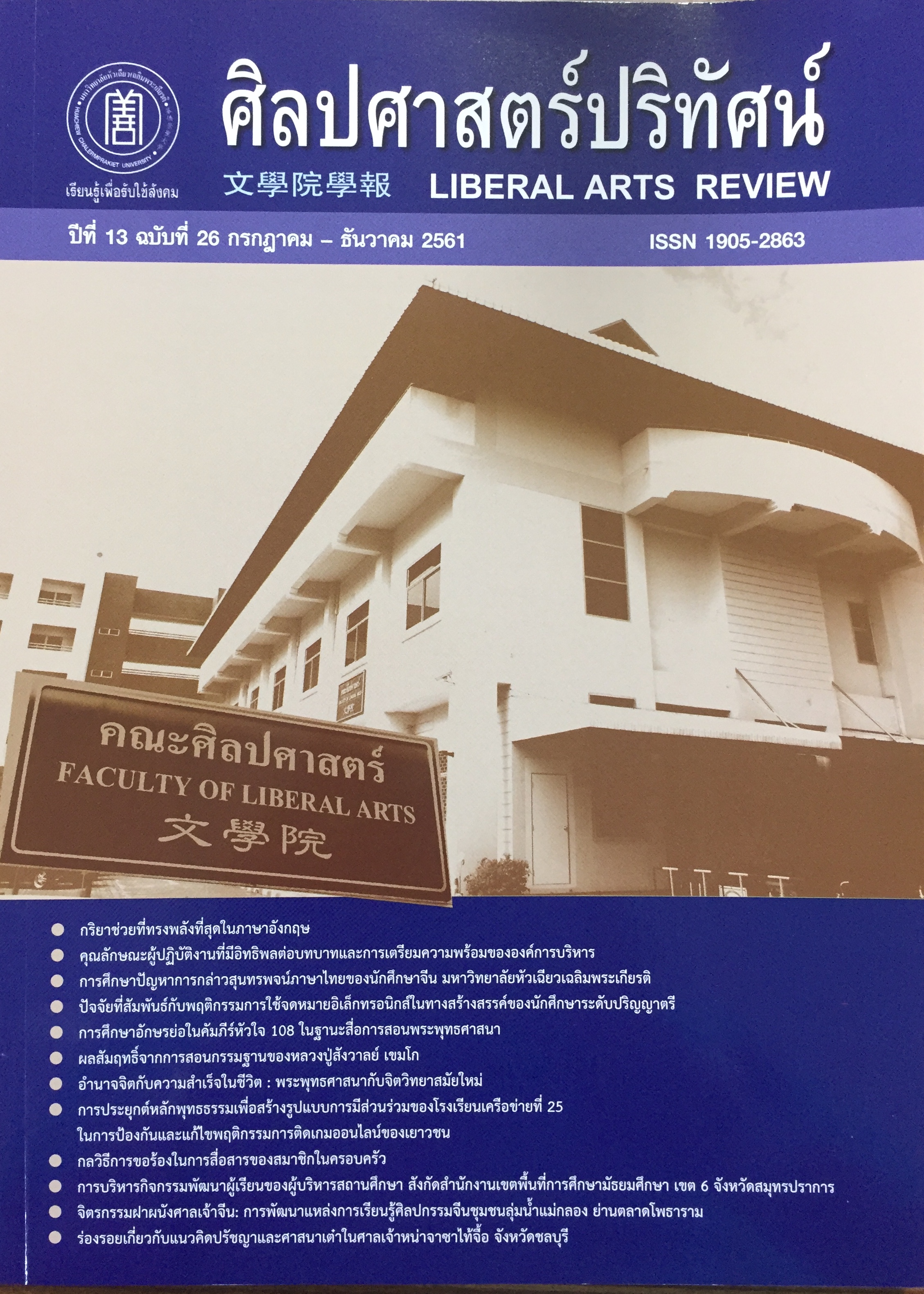The Power of Mind and the Acheivment in Life: Buddhism and Modern Psychology
Keywords:
The power of mind, The achievement of life, modern psychologyAbstract
This research aims to study the power of mind in Buddism and modern
psychology, to study the relation of mind power between Buddism and modern
psychology and to study the way to use mind power for the success in life of human
in present society. The researcher employed a qualitative research study by combining
documentary research from the Pali canon, the commentaries, the academic texts
including the related documents and research works. The findings are showe as below:-
Mind is the mental factors that create the awakening and intellenctual
development of human and mind is immortal. Mind development has an intellectual
effect on human. Positive psychology is the science of the West focuses on developin
human to be happy. The concepts of happiness in three types: (1) the pleasant life (2)
the good life and (3) the meaningful life. Positive psychology is rooted in the concept
of Buddhism.
Buddhist research found that there is relation between mind power in Buddhism
and modern psychology in developing human happiness with the principle that everyone
should develop their own excellence to achieve higher pleasures. They are the worldly
happiness, Samādhi Sukha, Jhāna Sukha, Vipassanā Sukha, and Nibbāna Sukha especticely.
The result of the research can help one to understand that power of mind in
Buddhism is real and can be brought up by Concentration Meditation up to the stage
is Jhāna. The mindfulness with breath in and out can be applied in everyday life anytime,
anywhere, immediately on demand. After practising, we can control and change our
mind to be in a good mental state as a Kusala (Positive Emotion) like Pāmojja, Piti,
Passaddhi, Sukha, and Samādhi. Practitioners can leash and eliminate the Kilesa-Akusala
(Negative Emotion) which is the 5 hindrances. After this, we can create happiness by
ourselves, and may even be further develop our minds to the ultimate pleasure if
Nibbāna.
References
สารนิพนธ์ พธ.ด. (สาขาวิชาพระพุทธศาสนา) พระนครศรีอยุธยา : บัณฑิตวิทยาลัย มหาวิทยาลัย
มหาจุฬาลงกรณราชวิทยาลัย.
พระวัชรินทร์ ปิยธมฺโม (ภาษิต). (2557) การศึกษาเชิงวิเคราะห์การพัฒนาจิตในมุมมองพระพุทธศาสนา.
วิทยานิพนธ์ พธ.ม. (สาขาวิชาพระพุทธศาสนา) พระนครศรีอยุธยา : บัณฑิตวิทยาลัย
มหาวิทยาลัยมหาจุฬาลงกรณราชวิทยาลัย.
มหาจุฬาลงกรณราชวิทยาลัย. (2539) พระไตรปิฏกภาษาไทย ฉบับมหาจุฬาลงกรณราชวิทยาลัย.
กรุงเทพมหานคร : โรงพิมพ์มหาจุฬาลงกรณราชวิทยาลัย.
สมเด็จพระพุฒาจารย์ (อาจ อาสภมหาเถระ), แปลและเรียบเรียง. (2548) คัมภีร์วิสุทธิมรรค. พิมพ์ครั้งที่
6. กรุงเทพมหานคร : โรงพิมพ์มหาจุฬาลงกรณราชวิทยาลัย.
อดิศักดิ์ ทองบุญ. (2532) ปรัชญาอินเดีย. พิมพ์ครั้งที่ 2. กรุงเทพมหานคร : ราชบัณฑิตยสถาน.
Downloads
Published
How to Cite
Issue
Section
License
บทความที่ได้รับการตีพิมพ์เป็นลิขสิทธิ์ของวารสารศิลปศาสตร์วิชาการและวิจัย
ข้อความที่ปรากฏในบทความแต่ละเรื่องในวารสารวิชาการเล่มนี้เป็นความคิดเห็นส่วนตัวของผู้เขียนแต่ละท่านไม่เกี่ยวข้องกับมหาวิทยาลัยหัวเฉียวเฉลิมพระเกียรติ และคณาจารย์ท่านอื่นๆ ในมหาวิทยาลัยฯ แต่อย่างใด ความรับผิดชอบองค์ประกอบทั้งหมดของบทความแต่ละเรื่องเป็นของผู้เขียนแต่ละท่าน หากมีความผิดพลาดใดๆ ผู้เขียนแต่ละท่านจะรับผิดชอบบทความของตนเองแต่ผู้เดียว




